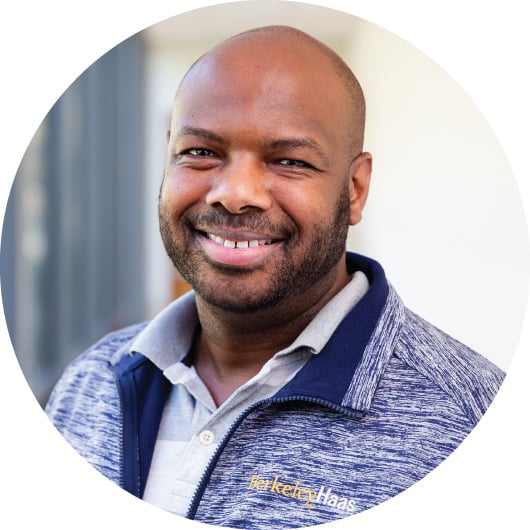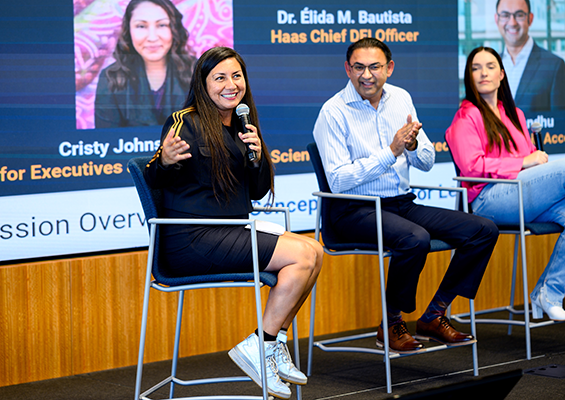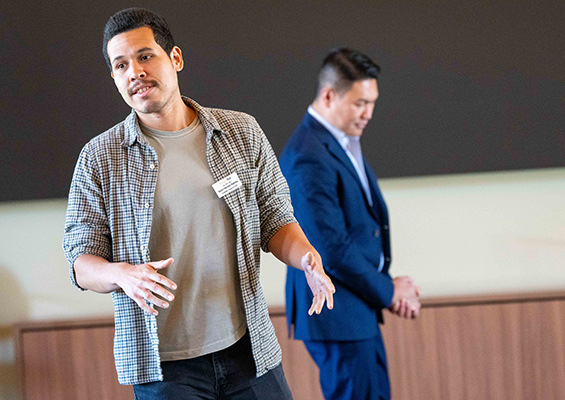“It can be uncomfortable when you are the first, or one of only a few people, to take your place in a space not built for you, or worse, in a space designed to keep you out.”
Speaking at the 2022 Berkeley Haas DEI Symposium, Élida Bautista, PhD, Berkeley Chief Diversity, Equity, and Inclusion Officer, explored that discomfort from the perspective of her own career. “I entered Claremont McKenna College as an undergraduate not long after the college had started to admit women, and there were even fewer Latinx students. Plus, everyone had taken AP classes in high school; my high school didn’t even offer them. In the summer, I worked at McDonald’s while my classmates were able to pursue internships.”
Élida went on to earn her doctorate in clinical psychology at the University of Michigan and held a post-doc fellowship at the University of California, Santa Barbara in the Department of Chicano Studies. She admitted, however, feeling compelled “to keep my doctoral research files for years just in case someone decided I was given my degree by mistake.” Before joining Berkeley Haas five years ago, Élida spent 14 years at the University of California, San Francisco filling various roles in the Department of Psychiatry, including clinical professor and director of the Multicultural Clinical Training Program.
Addressing impostor syndrome
During Élida’s talk at the 2022 Berkeley Haas Diversity Symposium, several audience members shared their own misgivings and self-doubts. One spoke about “having to be perfect. Always.” Another found the need “to constantly advocate for myself exhausting.” Those comments track with the definition of “impostor syndrome,” a name coined by Valerie Young, EdD, as “a pattern of behavior where people doubt their accomplishments and have a persistent, often internalized fear of being exposed as a fraud.”
She suggested ways to address impostor syndrome and to normalize one’s response to being an outsider. For example, she emphasized that “beginnings always mean change. Everyone feels off-base at the start.” That is true whether you are just beginning the MBA application process or walking into the first day of class.
I am in this space because my voice matters."
It is important, she continued, to remind yourself that “you can change the script. I’m dating myself here, but I imagine a cassette tape playing negative messages on a continuous loop. You need to change the script to something like, ‘I am in this space because my voice matters. I am here to contribute novel ideas, to speak to what others cannot because they don’t have my experience.’”
Diffusing stereotype threat
Impostor syndrome gets even more complicated when it is entwined with “stereotype threat.” This idea, popularized by Claude Steele in his book, Whistling Vivaldi, addresses group identity and the ways in which stereotypes can undermine the performance of the people they target.
Stereotype threat can become a self-fulfilling prophecy. “If women, for example, are perceived as no good at math, they sense they will be judged in terms of that negative stereotype. This creates stress and their performance can suffer. This doesn’t validate the stereotype, but it can perpetuate it,” Élida said.
“Of course,” she continued, “a little stress can be motivating. I logged in 15 minutes early for this Zoom presentation because I worried that something would go wrong. Everything was fine and I used that time to ground myself by turning off my screen and taking several deep breaths.” Other recommended calming techniques include guided meditation and music.
She also encouraged the use of visualization to counteract stereotype threat. “If you can see it, you can be it,” she said. “Do a Google search for the kind of role model you need: teachers as leaders, women in STEM, parents as students, leaders with disabilities. Use the images you find to inspire and remind you of your potential.”
Berkeley Haas offers plenty of role model candidates: members and supporters of our affinity groups, events like the annual Diversity Symposium, guest speaker series, and podcasts among them.
Affirming yourself
Élida closed her presentation with reassurance that was also a call to action: You rock! Affirm yourself!
“Highlight your self-worth by looking at your entire self and the things that make you unique: the causes you support, where you volunteer, the awards or promotions you have received. Emphasize the positive things that set you apart,” she said. “Those are the reasons you are needed, even in the places where you feel uncomfortable. No one else can contribute in exactly the same way that you can.”
Watch Élida’s full presentation: Invoking Your Inner Strengths & Community: Tools to Address Impostor Syndrome
Interested in learning more about the Diversity Symposium? The Diversity Symposium highlights role model candidates, members, and supporters to inspire you. 








